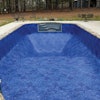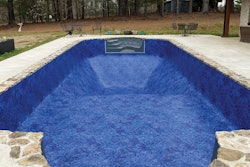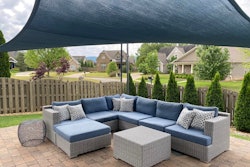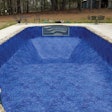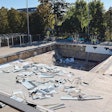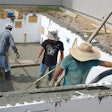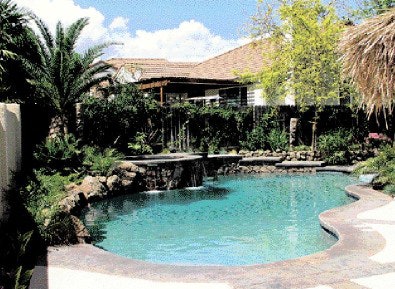
If anything can go wrong, it will." So says the first and most famous of Murphy's Laws, the one that any business professional is familiar with. In the world of pool installation, stopping problems before they start can be a matter of making wise choices before you begin. Each type of installation presents a unique set of issues for both builder and customer, but ones of time, cost, maintenance, pool longevity and environmental conditions are universal.
Knowing what type of pool will best suit both you and your customers is key, and if you haven't considered fiberglass as an option before, now may be the time to give it a second look.
Time Is Money
Every day you spend on a job is a day you cannot spend on the next one, so if you're a high-volume builder and you're crunched for time, fiberglass can provide solutions. According to Curt Prystupa, president of Sun Fiberglass Products, some fiberglass pools can be installed in a matter of days. "Within the course of a few days, you have a pool in place, ready for a cement decking," he says. "There's less material handling on the job, which equates to a faster time, and a faster time generates more revenue for the pool contractor."
Bronce Golden, owner of Cabo Pools in Vacaville, Calif., builds both gunite and fiberglass pools, and has found time to be one of the major advantages of fiberglass as well. "A fiberglass pool goes in so much smoother and faster," he says. "I can do a gunite in anywhere from 26 to 35 days, but there's not a fiberglass pool out here that should take over three weeks to build." Golden also notes that today's customers have changed. "People are smart today, they're informed," he says. "The Internet opens up everything — they say, 'That's the pool I want, I've already checked on it, let's write up a contract right now.' I mean, you don't have an hour in the backyard with them."
Bill Morgan, owner of Suncoast Pools and Spas on North Carolina's Outer Banks, works in a vacation area and relies on quick installation to turn a profit. "I'm in a resort area," he says. "The main thing is ease of installation." Not only is it impractical to spend three weeks installing a pool on a weekly rental property, but also the business volume generated from such jobs is too small. "For builders in the seasonal market, you can do almost twice the volume with fiberglass as you could do with cement," says Prystupa.
Alternately, if you've got the time and the inclination to expand your business, fiberglass offers a way to do that, too. Originally a gunite builder, Golden found himself missing a critical market niche in fiberglass. "The first year I did gunite only, and during that year with just my tiny phonebook ad, I must have had 15 to 20 calls from people interested in purchasing fiberglass pools," he says. "I knew I was missing a market there and I wasn't just going to leave that money on the table."
Cost Effective
If your customers don't have the money to spend on a custom concrete job, or if you find yourself knee deep in subcontractors, fiberglass can offer relief. Ronnie Parker, owner of Parker's Pools in Killeen, Texas, offers his customers pools they can afford. "The thing about fiberglass is that [customers] don't necessarily have to spend the kind of money they do on a gunite," he says. "People down here don't want to spend $30,000 to $50,000 on a pool; they want to spend somewhere in the $20,000s. And I can give that to them."
Builders such as Earl Horner, owner of West Coast Fiberglass Pools in Sonoma, Calif., assert that fiberglass is a good choice for customers because of lower associated costs as well. "It's not about the installation costs, it's the backside costs," Horner says. "[Customers] save a third on the chemicals and the maintenance, the cleaning and the pump running time — you only have to run a pump two to three hours."
When installing fiberglass you may be able to save on labor costs as well, with far fewer subcontractors, if any, needed for a standard job. "With a concrete pool, they have a phase for layout and excavation, one to lay the steel in, one to do the plumbing, one to shoot the shell, one to do the tile, one to pour the deck, one to do the interior surface, so there can be a barrage of subs," says manufacturer Curt Prystupa. "With fiberglass you can use your own manpower."
Horner agrees. "We don't need as many subcontractors. We keep inhouse the cement finishers, the electrical and the excavation." Keeping the number of subs to a minimum will naturally increase your profit margin, too, according to both Golden and Horner. "The profit margin for fiberglass is absolutely greater," says Golden. "I can't emphasize enough how much a dealer can make on these. They are little moneymakers."
Natural Challenges
Maybe you live in an area with a high water table or shifting soils. Using fiberglass can alleviate such environmental barriers to pool ownership. Mike DesRochers, owner of DesRochers Backyard Pools in Wilmington, Ill., recalls a difficult installation where nothing but fiberglass would have worked. "It was on an embankment, on the side of a hill basically, and the ground we were installing the pool in was a little bit shaky," he says. "We ended up having to put some pilasters under the pool itself, and it seemed like it wouldn't have been conducive to a vinyl-liner pool because we would have had to go so deep, but it was very conducive to a fiberglass pool."
A high water table can also be an issue when contemplating a time-consuming installation. "It takes so long to put a gunite pool in, whereas it takes us two days to get a pool in the ground," says Bill Morgan. "We only have to be dewatering the ground for a few days."
Alan Stahl, president of Viking Pools, says his company markets fiberglass pools as potential solutions for hazardous environmental conditions. "The flexural strength of a composite pool makes a composite pool ideal anywhere there is ground movement," he says. "Viking Pools is the only company that I am aware of that offers a warranty against earthquakes."
Shifting soil is another obstacle overcome with fiberglass. Michelle Stewart, national sales director for Hawaiian Fiberglass Pools, says her company markets pools based on this environmental condition. "Fiberglass has some inherent properties that other types of materials don't have that make it an acceptable solution for expansive soils, for drainage issues," she says. "That's not to say there aren't some things you need to do, certainly there are. In an expansive-soil setting you simply dig the hole a little bit bigger and a little bit deeper and put sand all the way around it instead of putting in back-fill."
Fiberglass can also fit into locations where other pools would be impossible. "We can engineer our pools so that they can be suspended in wooden decks for hillsides or oceanfront construction," says Prystupa. "The pool can be partially out of the ground so they can do a different deck style."
Maintain, Maintain Both you and your customers lead busy lives. If an obstacle to ownership is time spent maintaining their pools, offer your customers fiberglass: problem solved. Fiberglass can help reduce the pool's chemical consumption, manufacturers say. "You need fewer chemicals because your water is staying balanced," says Bronce Golden. "You're not losing any water from it seeping out of the pool. It's only evaporating," he says. A fiberglass pool is nonporous, so customers don't have to worry about chemicals leaching into, or out of the pool.
Repairs are also nearly a non-issue with fiberglass as long as customers take care of their water. "We're not going to be replastering our pools every five to seven years. Basically if you take care of your water even half way reasonably, you will never replace the gel coat on a fiberglass pool," says Horner. "We use vinyl-ester resin and you just don't have to go out and patch or repair or touch it up." And if your busy customers go on vacation and forget about their fiberglass pool for awhile. "You could go on vacation, everything could shut down, the whole thing could turn green and you could clean it right back up again," says Horner. "There's no damage to your pool."
Long Live Fiberglass
With proper maintenance, fiberglass pools can last for many years. Prystupa has been building fiberglass pools for 20 years and says even the oldtimers are aging gracefully. "The pools I put in 20 years ago are still in service today," he says. "As long as the customers maintain the pool within our factory specifications for the water chemistry, they'll last indefinitely."
As a means of advertising, Bronce Golden has an empty fiberglass pool shell propped on end on a California freeway. "The pool that I have on the road has been on the road for three years, with no water in it, in direct sun, with cold weather, in 100-degree weather, and we pulled it out in February to take it to a pool show, brought it home, power washed it, waxed it up and it looks brand new. It doesn't have a smudge on it. No cracks, nothing. It's ready to go."
With all of the benefits of fiberglass — quick installation, lower costs, environmental adaptability, ease of maintenance and especially long life — something dealers won't have is repeat business, at least not usually. "I had a lady call here last year," says Golden. "She says 'I'm interested in a fiberglass pool,' and I said, 'Well thank you, can I take your name and number and send you a brochure.' She says, 'Nope, I don't need a brochure, I just need somebody to come out, this is going to be my third fiberglass pool.' And I said, 'Oh, what was wrong with the others.' And she says, 'Nothing, stupid, I've moved three times!'" Maybe Murphy was right about what can go wrong, but when installing fiberglass, chances are you'll never even find out.



















